-
Bio: Gloria Esteva
July 19, 2012
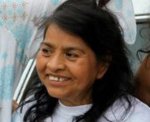
Gloria Esteva was born in Oaxaca, Mexico. While she was there she was already working with her community, specifically defending worker’s rights. She came to the United States to support her grandson, who became sick with leukemia after a petroleum leak in his native state of Veracruz. She moved with him to San Francisco, where she spent the next four years taking care of him and writing about his life. She considers herself a community organizer who tries to talk to people in ways and language that they understand. She says that as she has gotten to know the people of the United States, she has realized that there are many who believe in justice, and that them and everyone in the country should think about the contributions that immigrants have made to their personal lives, and realize that “we deserve dignity and respect.” She is on the bus with her daughter because she is tired of living in the shadows, and wants her community to know that she organizes and lives without fear despite not having immigration documents.
Read More » -
Bio: Barni Axmed Qaasim
July 19, 2012
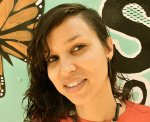
Barni Axmed Qaasim came to Phoenix, Arizona when she was 3 years old from Mogadishu, Somalia. She is a product of Love & Migration because her family has roots in Somalia, England, Ireland, Scotland and Yemen. "I grew up in Phoenix and felt deeply hurt when I saw a white supremacist attack being launched on people who I grew up with. I think of my family members who have been forced to migrate out of Somalia & Yemen because of war, famine and poverty. Their trek across harsh terrain to Europe and the trek across the Sonoran Desert is the same struggle -and the causes are the same: poverty, political corruption and transnational corporations." Barni is a documentary filmmaker and volunteer for Puente and the Somali Association of Arizona. She is dedicated to capturing images and sounds that shine a light on the efficacy and strength of communities that are left out of or are misrepresented by mainstream media. "It is my hope that my work honors the sophisticated oration and poetry tradition of my Somali culture."
Read More » -
Bio: Kitzia Esteva
July 19, 2012
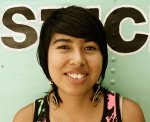
Kitzia Esteva was born in Mexico D.F. and came to California nine and a half years ago to reunite with her family. Her mom, sister and two nephews came two years before seeking treatment for her nephew diagnosed with leukemia. She is now 25 and living in Los Angeles, California. She remembers being stopped by the police one for not wearing a seatbelt, and fearing that she would be identified as an undocumented immigrant if fingerprinted. For her, being undocumented has meant not being able to work legally to help her family, losing work opportunities, being employed as a domestic worker, and being afraid to be separated from her family. Her mother, who is also on the bus, has helped her be active in social justice struggles by setting an example. As Kitzia got involved in community organizations she began to learn that what she had experienced as undocumented was happening to many, and that there is power in organizing. Kitzia is on the bus for her family, and “because it is a powerful way to confront the way immigrants are treated and change the conversation of criminalization towards one of dignity.”
Read More » -
Bio: Euclides Lozano
July 19, 2012
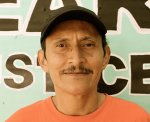
Euclides Lozano is 49 years old, and has been the driver for the No Papers No Fear bus. He came to the U.S. over 20 years ago from El Salvador and lives in Maryland. His experience organizing comes from living in El Salvador during war, and being part of the popular movement when he was 16. He applied for political asylum but did not obtain it, and in 1988 was able to regularize his status during the immigration amnesty. He continued organizing Salvadorians and solidarity groups denouncing violations to human rights. Regarding his participation on the bus, he says he came because his daughter told him he was needed. “As an immigrant I share the same struggle to be treated as a human being, with dignity, who deserves respect and rights. Anti immigrant laws are currently attacking those rights. When I came the laws were different and through amnesty I was able to work and live a better life. That is why I am here. I believe regularizing undocumented immigrants would benefit not just them but the whole country as people work, pay taxes, and contribute.”
Read More » -
Bio: Erika Ovalle
July 19, 2012
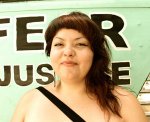
Erika Ovalle lives in Phoenix, Arizona. She grew up around gangs and seeing police abusing their power. When she was young the police came to look for one of her brothers without a search warrant, but still kicked down all the doors and threatened to shoot their pet dogs. This was one her earliest experiences with law enforcement. Her two older brothers are in prison, and so she feels a deep connection with criminalization and family separation. She began organizing in school with the MECHA group, feeling at home with the symbols and images rooted in Mexica culture, and since then has been involved in various community organizations, helped organize school walk outs and protests. She can often be found with a megaphone leading chants whenever needed. She is on the bus because she sees the human rights violations that happen every day in Arizona. “I want to support my fellow human community to fight for human rights. I see this as historic struggle for rights and freedom and I am proud and humble to be on it.”
Read More » -
Bio: Diane Ovalle
July 19, 2012
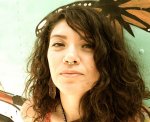
Diane Ovalle lives in Phoenix AZ and is 27 years old. Immigration policies and incarceration hit close to home. When her partner was picked up by police on the freeway and placed in deportation proceedings she felt like there was nothing she could do. She could not go to see him in detention and had no way of getting in contact with him. Her community held car wash fundraisers and tried to find a lawyer to fight his case. Diane also has two family members in jail and sees the ways in which immigrants and other populations are criminalized and funneled into one system that uses people as a source of profit. As laws got worse in Arizona for immigrants Diane’s interest of how to volunteer and assist the community grew. She volunteers with Puente organizing with whole families. She is on the bus to provide documentation for the caravan “to show the connections we have made, the stories shared. I am a lover of studying what social movements have done, and I’m exited to see how us traveling with out fear will help support other communities to move forward out of the shadows, and to see how to support other communities who are going dealing with the effects of laws like SB 1070.”
Read More » -
Bio: Jovana Renteria
July 19, 2012
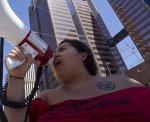
Jovana Renteria is 33 years old and lives in Arizona. Seeing her peers and family fall into drug epidemic she got involved with MECHA, while in high school, wanting to do something about it. “It was killing me that I could not do anything, there was no help anywhere. I could see families being separated on daily basis, my own included.” Her mother’s husband was deported. Jovana is on the bus “to bring a higher awareness of the real stories of people that are really being affected by [immigration policies] and what they are doing about it [to fight back]. And provide legal support.”
Read More » -
Bio: Juan Jose Mangandi
July 19, 2012
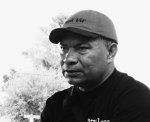
Juan Jose Mangandi is a day laborer and an artist. He lives in Los Angeles and does theatre work to help people find pride and hope, and to let people know they are not alone in their experiences as undocumented community members. “I’m on the Undocubus to fight fear and persecution. To let people know that we are on a Journey for dignity, and that there are many brave people willing to challenge the stigma of being undocumented, facing rejection and fear face to face. Along the way we are finding strong allies and learning that as a community we are strong.”
Read More » -
Bio: Marisa Franco
July 19, 2012
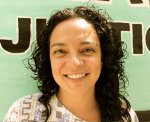
Marisa Franco was born in Guadalupe, Arizona, with family coming from Sonora, Mexico. She grew up identifying as a Chicana amongst a strong and rich Mexican/ Chicano community. She has a long history of organizing and being involved in activism. One of the first forms of speaking out against immigration policy was when she was in high school and she heard about proposition 187, a state-wide legislation that would have significantly cut off access to public services, including schools, for undocumented migrants. Growing up she continued to be vocal about injustices, and tried various types of approaches to social change, including service, advocacy, student activism, and feeling like she was hitting the ceiling. Then she took a trip to Cuba, where she appreciated the self-determination of people, with all its contradictions, but it inspired her to become an organizer. She has worked on a variety of social justice issues, including prison rights, rights of people who are homeless, welfare reform, gentrification and migrant rights. When Arizona’s SB 1070 began being discussed, she went to her home state, Arizona, to organize for the first time there, and feels like she found her purpose. She is on the bus because she strongly believes that it is time to pose dilemmas that make us all uncomfortable in order to reach a place that addresses the problems facing the community. She says, “I want to be part of efforts to create space for the leadership of people affected by these different policies. It is the right thing, the right time.”
Read More » -
Bio: Kemi Bello
July 19, 2012
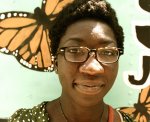
Kemi Bello came to the U.S. when she was 6 years old from Lagos, Nigeria. Her getting on the bus coincides with her 18th anniversary living in the U.S., specifically Texas, and just last month was the beginning of her 7th year in removal proceedings. Her and her family traveled here looking for treatment for her little sister, who is suffered from complications from birth, and has cerebral palsy. She is an accomplished migrant rights organizer, blogger, and poet, and a person who is constantly thinking about what it means to organize as an undocumented person. She says she is on the bus because she feels “there has been a very specific and narrow view perpetuated of the undocumented experience, especially that of undocumented youth.” She says that one way to expand the narrative to include all people who are members of the undocumented community is by building dialogues and telling our stories because “Only the undocumented community can build a narrative of undocumented people in the United states.”
Read More »